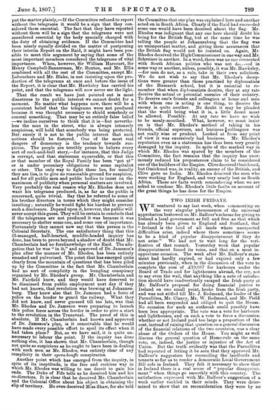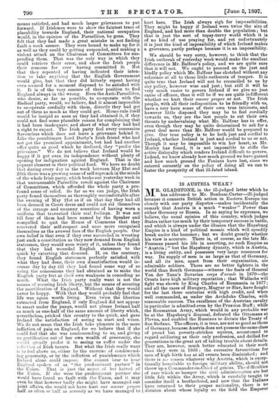TWO IRISH FRIDAYS.
WE ventured to say last week, when commenting on- the very singular phenomenon of the universal approbation bestowed on Mr. Balfour's scheme for giving to Ireland a local government as full and free as that which has already been given to England and Scotland, that " Ireland is the land of all lands where unexpected difficulties arise, indeed where there sometimes seems to be a kind of popular disappointment if they do not arise." We had not to wait long for the veri- fication of that remark. Yesterday week that popular disappointment found its voice, and that on a most in- opportune occasion. The week after Mr. Balfour's state- ment had hardly expired, or had expired only a few minutes previously, when in the discussion of the vote to complete the sum of £19,087 for harbours under the Board of Trade and for lighthouses abroad, the cry, not to say even the wail, that anything like a note of satisfac- tion should have inadvertently escaped the Irish party at Mr. Balfour's proposal for doing financial justice to Ireland on one small point, broke from the Irish party, and was not stifled till Mr. J. Redmond, the leader of the - Parnellites, Mr. Clancy, Mr. W. Redmond, and Mr. Field. had all been suspended and obliged to quit the House. No occasion for such an outbreak could possibly have- been less appropriate. The vote was a vote for harbours and lighthouses, and on such a vote to force a discussion. whether or not Ireland paid too large a proportion of the cost, instead of raising that question on a general discussion of the financial relations of the two countries, was a clear abuse of the Orders of the House. You might as well discuss the general question of Home-rule on the same vote, or, indeed, the justice or injustice of the Act of Union. But the truth evidently was that the Parnellites had repented of letting it be seen that they approved Mr. Balfour's suggestion for reconciling the landlords and tenants so far as to render a democratic Local Government Bill safe in Ireland. They felt it necessary to show that in Ireland there is a real sense of " popular disappoint- ment " when things go smoothly with this country. The satisfaction expressed with Mr. Balfour's suggestion of a. week earlier rankled in their minds. They were deter- mined to show that on reconsideration they were by no means satisfied, and had much larger grievances to put forward. If Irishmen were to show the faintest trace of placability towards England, their national occupation would, in the opinion of the Parnellites, be gone. They felt that they had made a great mistake in not finding fault a week sooner. They were bound to make up for it as well as they could by getting suspended, and making a violent attack on the Chairman of Committees for sus- pending them. That was the only way in which they could retrieve their error, and show the Irish people their remorse for ever having committed it. Not that they repented of having indicated their inten- tion to take any thing that the English Government would give, but that they did bitterly repent having even seemed for a moment disposed to be satisfied with it. It is of the very essence of their position to find England always in the wrong. Even the Anti-Parnellites, who desire, so far as possible, to co-operate with the Radical party, would, we believe, find it almost impossible to co-operate cordially with them, directly they had got out of them as much as they could get. Home-rule itself would be insipid so soon as they had obtained it, if they could not find some plausible reason for complaining that it had been inadequate, and short of what they had had a right to expect. The Irish party feel every concession flavourless which does not leave a grievance behind it. Like the penultimate Lord Derby's Irish friend who had not got the promised appointment, but had had another offer quite as good which he declined, they "prefer the grievance." We do not believe that Ireland would be happy if it got even its independence without plenty of opening for indignation against England. That is the piquant element in their political food. We have no doubt that during every day in the week between May 21st and 28th there was a growing sense of self-reproach in the minds of the whole Irish party, which broke out yesterday week in that unreasonable Parnellite revolt against the Chairman of Committees, which afforded the whole party a pro- found sense of relief. So far as we can judge, the Irish party found themselves as thoroughly uncomfortable after the evening of May 21st as if on that day they had all been dressed in Court dress and could not rid themselves of the strange and uncanny sensation of having worn a uniform that travestied their real feelings. It was not till four of them had been named by the Speaker and compelled to quit the House of Commons that they recovered their self-respect and once more recognised themselves as the avowed foes of the English people. Our own belief is that even if they ever succeeded in wresting just such a constitution as they now demand from English statesmen, they would soon weary of it, unless they found that they had wounded English statesmen to the .quick by extorting that demand. If, on the contrary, they found English statesmen perfectly satisfied with what they had done, their own dissatisfaction would in- crease day by day till they had found some way of so using the concessions they had obtained as to make the English party fret at their own weakness in conceding so much. What the Irish party really want is not the means of securing Irish liberty, but the means of securing the mortification of England. Without that they would never be happy. With that they would probably feel that life was again worth living. Even twice the liberties extracted from England, if only England did not appear to smart under the pangs, would not please Ireland half as much as one-half of the same amount of liberty which, nevertheless, pricked this country to the quick, and gave Ireland the satisfaction of seeing us start and wince. We do not mean that the Irish take pleasure in the were infliction of pain on England, for we believe that if she could feel that she was condescending to us, and giving us gratification out of her own wealth of generosity, she mould greatly prefer it to seeing us suffer under the infliction of Irish taunts. But what the Irish really want is to feel above us, either by the exercise of condescend- ing generosity, or by the infliction of punishments which Ireland alone could impose. She cannot bear to hear England spoken of as " the predominant partner" in the Union. That is just the secret of her hatred of the Union. If she were the predominant partner she would have found no fault with the Union, and it may even be that however badly she might have managed our joint affairs, she would not have hurt our amour propre half as often or half as severely as we have managed to hurt hers. The Irish always sigh for impossibilities. They might be happy if Ireland were twice the size of England, and had more than double the population ; but that is just the sort of topsy-turvy world which it is of no kind of use praying for, and yet unfortunately it is just the kind of impossibility of which Ireland makes a grievance, partly perhaps because it is an impossibility.
We should be very sorry, however, to think that the Irish outbreak of yesterday week would make the smallest difference in Mr. Balfour's policy, and we are quite sure that it will net. We ought to proceed on the just and kindly policy which Mr. Balfour has sketched without any reference at all to these little outbursts of temper. It is quite true that Ireland will not be reconciled to us by any policy, however wise and just ; but still it will be very much easier to govern Ireland if we give no just cause of offence, than it will be if we are quite indifferent whether we hurt their amour propre or not. The Irish people, with all their indisposition to be friendly with us, have a very keen sense of their own true interests, and however little disposed they may be to feel cordially towards us, they are the last people to cut their own throats by undervaluing what Mr. Balfour has to offer, even though they may be quite determined to ask for a great deal more than Mr. Balfour would be prepared to give. Our true policy is to be both just and cordial to Ireland, whether Ireland is just and cordial to us or not. Though it may be impossible to win her heart, as Mr. Morley has found, it is not impossible to stifle the active disloyalty which renders Ireland difficult to govern. Indeed, we know already how much ground we have gained and how much ground the Fenians have lost, since we entered earnestly on the policy of doing all we can to foster the prosperity of that ill-fated island.







































 Previous page
Previous page